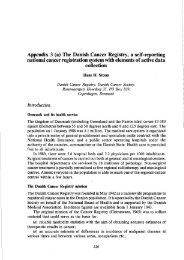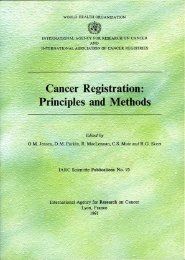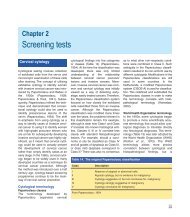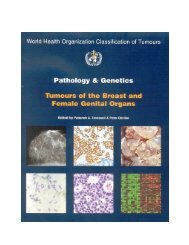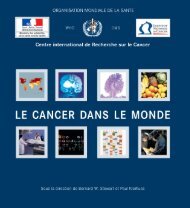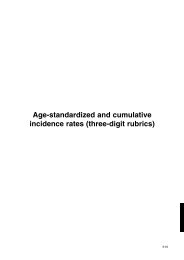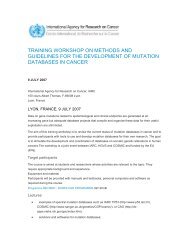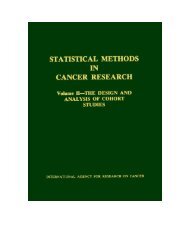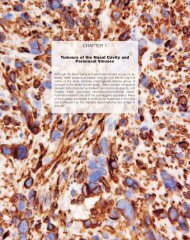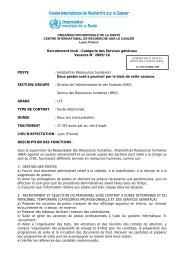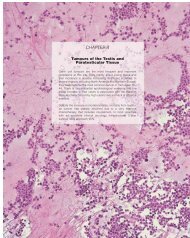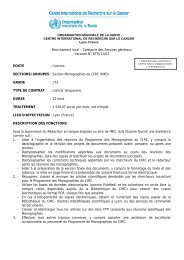world cancer report - iarc
world cancer report - iarc
world cancer report - iarc
Create successful ePaper yourself
Turn your PDF publications into a flip-book with our unique Google optimized e-Paper software.
IMMUNOSUPPRESSION<br />
SUMMARY<br />
>Persistent suppression of the immune<br />
system results in an increased <strong>cancer</strong><br />
risk.<br />
> An increased incidence of malignant<br />
lymphomas, of which the majority contain<br />
the Epstein-Barr virus, is caused by<br />
immunosuppressive drugs used to prevent<br />
the rejection of organ transplants.<br />
> Infectious agents that cause severe<br />
immune suppression, such as the<br />
human immunodeficiency virus (HIV),<br />
are associated with an increased incidence<br />
of several tumours, including non-<br />
Hodgkin lymphoma and Kaposi sarcoma.<br />
Immunosuppression is a reduction in the<br />
capacity of the immune system to respond<br />
effectively to foreign antigens, and can be<br />
either transient or permanent.<br />
Certain chemicals and drugs, ionizing radiation,<br />
and infection with particular viruses<br />
and parasites can cause immunosuppression.<br />
This phenomenon is observed in<br />
humans and in experimental animals.<br />
Immunosuppression after exposure to Xrays<br />
or other ionizing radiation is most pronounced<br />
when the entire body, rather than<br />
a limited area, is irradiated.<br />
Immunosuppression by chemicals or radiation<br />
is dose-dependent, the intensity and<br />
duration of the effect increasing with<br />
increasing dose or continuing exposure,<br />
and is generally reversible with cessation<br />
of exposure. In contrast, infection with certain<br />
pathogens, such as human immunodeficiency<br />
virus, is persistent and the<br />
immune deficiency that results is progressive,<br />
unless the infection is effectively<br />
treated.<br />
Immunosuppression should be distinguished<br />
from various forms of immune<br />
deficiency resulting from certain genetic<br />
defects (e.g. ataxia telangiectasia, ATM;<br />
Wiskott-Aldrich Syndrome, WASP; X-linked<br />
68 The causes of <strong>cancer</strong><br />
severe combined immunodeficiency, γc).<br />
Persistent immunosuppression, especially<br />
when accompanied by continuing exposure<br />
to foreign antigens such as organ<br />
transplants, presents a risk for <strong>cancer</strong>,<br />
though not all tumour types arise with<br />
equal frequency. Ciclosporin and related<br />
compounds are widely used to facilitate<br />
organ transplantation by decreasing the<br />
risk of rejection. Risk is especially high for<br />
various forms of lymphoma and for certain<br />
other <strong>cancer</strong>s that are associated with viral<br />
infections.<br />
Immunosuppression mediated by<br />
drugs<br />
Immunosuppression achieved by administration<br />
of drugs is used to treat autoimmune<br />
diseases (e.g. rheumatoid arthritis)<br />
and, usually involving the relevant drugs at<br />
much higher dosage, to maintain the functional<br />
and anatomic integrity of foreign tissues<br />
grafted to another individual. A graft<br />
from any individual except oneself or an<br />
identical twin will provoke an immune reaction<br />
against the grafted tissues, the intensity<br />
of which varies with the degree of antigenic<br />
difference between graft and host. In<br />
Drug or infectious agent Cancer site/<strong>cancer</strong><br />
Table 2.19 Immunosuppressive agents associated with development of <strong>cancer</strong>.<br />
the absence of adequate immunosuppression,<br />
the host will destroy the graft. Whole<br />
organs (e.g. kidney, heart, liver, lung) can<br />
be transplanted with maintenance of function<br />
that may continue for a lifetime when<br />
appropriate levels of immunosuppression<br />
are maintained. The risk of <strong>cancer</strong> increases<br />
with increasing intensity and duration of<br />
immunosuppression [1].<br />
Apart from deliberate suppression of the<br />
immune response in the context of organ<br />
transplantation, immunosuppression may<br />
arise as a side-effect of some drugs, and<br />
specifically many cytotoxic agents widely<br />
used in <strong>cancer</strong> chemotherapy. This action<br />
may contribute to the development of “second<br />
<strong>cancer</strong>s”, particularly in children. More<br />
generally, patients receiving <strong>cancer</strong><br />
chemotherapy are vulnerable to infectious<br />
disease as a result of their immune system<br />
being compromised.<br />
The suggested mechanisms of action of<br />
immunosuppressive agents [2] include:<br />
- Interference with antigen-presentation<br />
mechanisms;<br />
- Interference with T-cell function; inhibition<br />
of signal transduction or receptor actions<br />
(ciclosporin);<br />
Azathioprine Non-Hodgkin lymphoma, Kaposi sarcoma,<br />
squamous cell carcinoma of the skin, hepatobiliary<br />
<strong>cancer</strong>s, mesenchymal tumours.<br />
Cyclophosphamide Bladder <strong>cancer</strong><br />
Ciclosporin Non-Hodgkin lymphoma, Kaposi sarcoma<br />
Human immunodeficiency Non-Hodgkin (B-cell) lymphoma, Kaposi sarcoma<br />
virus-1 (HIV-1) (increased risk by coinfection with herpesvirus 8)<br />
Epstein-Barr virus Burkitt lymphoma (in conjunction with malaria<br />
infection), non-Hodgkin (B-cell) lymphoma in<br />
immunosuppressed patients, Hodgkin disease,<br />
smooth muscle tumours in immunosuppressed<br />
individuals<br />
Human herpesvirus 8 Kaposi sarcoma<br />
Human papillomaviruses Cancers of cervix, vulva and anus



